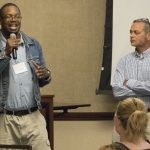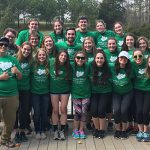
Posted on November 20, 2017
People with disabilities are often treated unfairly in the workplace. To make matters worse, people with disabilities who come from a minority racial background are at even more of a disadvantage. As a black man with autism, I fit into that category. I believe a person, regardless of disability or the color of his skin, should be evaluated on the content of his character and on the quality of his work as an employee. However, the stigma still exists that

Posted on October 20, 2017
Let’s begin with SWEET:
“Have a good day, sir!” Ian Snitch said enthusiastically to a guest exiting the Courtyard by Marriot – a courteous and attentive act that Ian executed even before his supervisor, a front-desk specialist, had gotten the chance.
It would be just one of many things Ian said and did on Disability Mentoring Day (DMD) that impressed and amazed me. A first-year student in the University of Delaware’s Career and Life Studies Certificate (CLSC) program, Ian, along
This entry was posted in Center for Disability Studies, community living, developmental disabilities, diversity, Education, employment, inclusion, independent living, intellectual Disabilities, people with disabilities, Uncategorized, University of Delaware and tagged Courtyard by Marriott, Disability Mentoring Day, Office of Disability Employment Policy, Senator Chris Coons, University of Delaware.

Posted on April 13, 2017
What does it mean to be an ally? That’s something I asked my fellow University of Delaware colleagues multiple times over spring break and something nearly 600 UD students all over the country have been thinking about. They and I are a part of an organization called University of Delaware alternative Breaks (UDaB).
UDaB is a student-run organization at UD that coordinates service-based learning experiences across the country that focus on social issues. Our 20 trips this spring break emphasized

Posted on August 19, 2016
The numbers are concerning. The percentage of children with autism in Delaware schools has more than tripled over the past 12 years and services have failed to keep up. Families report waiting more than a year to receive an accurate diagnosis after they first notice symptoms. And 62 percent of children under five had to see at least three different clinicians before autism was identified.
Why is it still so hard for people with autism and their families to receive
This entry was posted in autism, Center for Disability Studies, developmental disabilities, employment, people with disabilities, training, Uncategorized, University of Delaware and tagged Autism Delaware, Blueprint for Collective Action, CDS video, Delaware Department of Education, Delaware Department of Public Health, Delaware Family Voices, Delaware Network for Excellence in Autism (DNEA), Delaware schools, Leadership Education in Neurodevelopmental Disabilities (LEND), Nemours/A.I. DuPont Hospital for Children.





